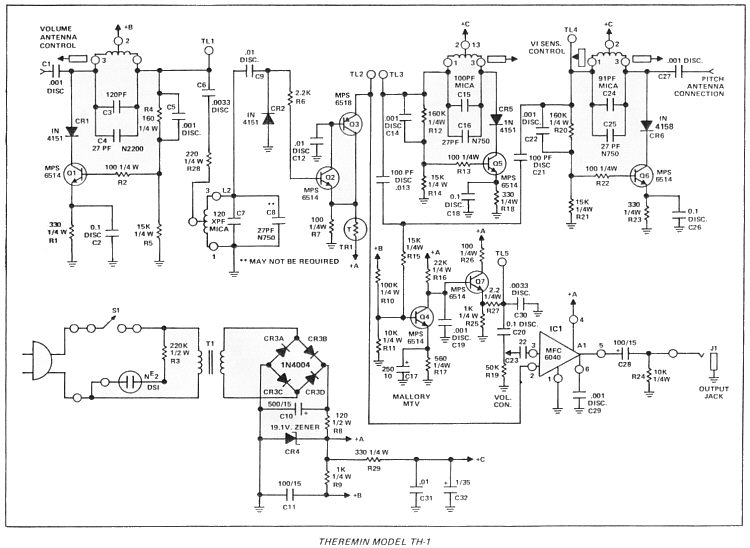Hey everyone. I've got a Maestro HT-1 theremin in for a tune up, and it's having two issues: 1) the volume field is super compressed, acting like the action is reversed and 2) the sound becomes distorted at loud volumes (possibly due to issue 1). I'd appreciate any advice or thoughts on the the issues.
I have probed the 5 test points, and identified what each one is:
TL1: Volume oscillator (clean sine wave but having trouble reading frequency with my meter, 9.0 V DC)
TL2: Volume control DC voltage
2.75 V — hand away from volume
0.9 V — hand just above plate
4.2 V — hand touching plate
TL3: Fixed pitch oscillator (clean sine wave but having trouble reading frequency with my meter, 9.21 V DC)
TL4: Variable pitch oscillator (clean sine wave but having trouble reading frequency with my meter, 9.21 V DC)
TL5: Pitch waveform before volume control
A+: 9.35 V DC
B+: 9.02 V DC
C+: 9.18 V DC
C10, C32, and C17 were recapped before I got it with modern, correct-value electrolytic caps (but oddly C28 was left original...)
Here's how the volume control is behaving: Volume increases as hand approaches antenna and then drops off quickly when only a millimeter or so above the plate and goes silent when touching the plate. Looking at the voltage on the scope, when I place both hands (larger mass) very close to the antenna, it's working correctly but in a very compressed field (see video below). This makes sense looking at the voltages measured at TL2 and the datasheet for the MFC6040, Figure 3 Attenuation vs. DC CV. So I think the MFC6040 is working correctly but the voltage range is offset (possibly due to the oscillators...? too much capacitance in the volume oscillator circuit...? or thermistor...? or...?).
The volume oscillator coils' tuning slugs are still in their factory state as the thread locking glue is still intact, so I'm hesitant to tune the volume oscillators just yet. While I can't get a stable frequency reading with my meter, the oscillators look like nice sine waves on my oscilloscope. The pitch section is working fine.
Here is video:
http://mikebuffington.net/maestro/TH-1_TL1_Scope.mov Volume Oscillator (0.5 V/Div, 1μ Sec/Div)
http://mikebuffington.net/maestro/TH-1_TL2_Scope.mov Volume Control DC Voltage (1 V/Div)
http://mikebuffington.net/maestro/TH-1_TL3_Scope.mov Fixed Pitch Oscillator (0.5 V/Div, 1μ Sec/Div)
http://mikebuffington.net/maestro/TH-1_TL4_Scope.mov Variable Pitch Oscillator (0.5 V/Div, 1μ Sec/Div)
http://mikebuffington.net/maestro/TH-1_TL5_Scope.mov Pitch waveform before Volume Control (0.5 V/Div, 1 Sec/Div)
I've also created fabrication drawings for the antenna, if anyone is interested: http://mikebuffington.net/maestro/TH-1_Antenna&Base.PDF






